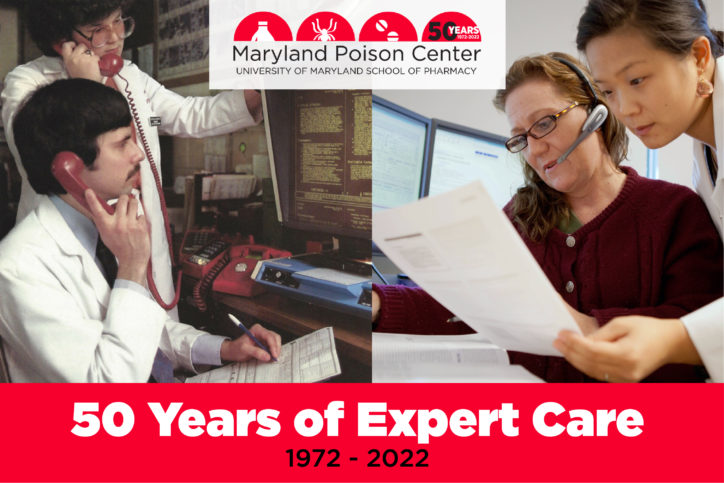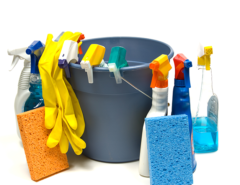The Maryland Poison Center (MPC) is celebrating its 50th anniversary in 2022.
Mission
Since 1972, it has been our mission to decrease the cost and complexity of poisoning and overdose care while maintaining and/or improving patient outcomes. More simply stated, we strive to save lives and dollars. We do this by providing emergency assessment and treatment of poisonings, and prevention information, to Maryland’s citizens and health care professionals.
About Us
The MPC is staffed 24 hours a day, 365 days a year by pharmacists and nurses who are certified specialists in poison information (CSPI). Our specialists have more than 250 years of combined experience managing poisoning and overdose cases!
The MPC is certified by the American Association of Poison Control Centers (AAPCC) as one of 55 regional poison centers in the country. Our service area covers 4.1 million Marylanders, in 21 counties and Baltimore City.
In addition to the CSPI’s, the MPC’s staff consists of directors, board certified clinical toxicologists, toxicology fellows, health educators, IT support, and administrative staff. While the 24/7 telephone service is what we are most commonly known for and is a vital service, other activities take place at the poison center. Education of the public, health care students, and health care professionals is another important service we provide. We also conduct research to learn more about poisoning and overdose cases happening in our service area and beyond.
50 Years of Expert Care
Over the last 50 years, the MPC has managed approximately 2.5 million cases. These cases include poisoning emergencies in humans, animals, as well as calls for information about poisons and poison safety.
We have been a public service through the University of Maryland School of Pharmacy since 1972, and have continued to grow over the years. During the first year, the center managed 5,600 cases and kept paper records. In 2021, the MPC managed more than 37,000 cases- including more than 29,000 human exposures and the rest animal exposures and calls for information- using a sophisticated electronic system to track and manage calls.
MPC’s Role in Public Health Events
As you can imagine, a lot has happened over 50 years. The MPC has played an important role in significant public health events in Maryland. These events range from things drug use trends, food poisoning outbreaks, product recalls, potential acts of terrorism, and more. The specialists were called to help assess and treat people with poisonings and overdoses, as well as answer information questions and provide prevention information. Here’s a look at some of those events:
- 1979- long lines at gas pumps forced some people to use their mouth to “siphon” gasoline- sucking on a tube from one car to put into another- causing people to swallow gasoline.
- 1982- Tylenol was contaminated with a harmful chemical, cyanide.
- 2001- Train fire in the tunnel under Baltimore City causing a release of toxic smoke into the air.
- 2001- Attacks using letters laced with the harmful bacteria anthrax being mailed to media companies and congressional offices
- 2009, 2010, and 2011- carbon monoxide exposures from the use of generators during major blizzards and tropical storms
- 2010-present- Abuse of synthetic marijuana and the new stimulant known as “bath salts”
- 2011- skin lightening creams containing mercury
- 2015-present- Administration of bystander naloxone for opioid overdoses
- 2015- Newly designed laundry packets commonly being ingested by children
- 2017-present- Opioid epidemic beginning in 2017, leading to Governor Larry Hogan declaring a state of emergency and bystander naloxone made available without a prescription. The MPC continues to assist in tracking usage of the lifesaving drug.
- 2018- K2/Spice contaminated with brodifacoum leading to severe bleeding
- 2019- E-cigarette or Vaping Use-Associated Lung Injury (EVALI)
- 2020-present- COVID-19 pandemic
- Chloroquine and hydroxychloroquine exposures
- Bleach and household cleaning products exposures
- Ivermectin exposures and general information
- Teaching collaboration with two additional regional poison centers (A-TEAM) to virtually educate medical professionals in toxicology during the pandemic
How you can get involved with the MPC
- Sign up for our e-newsletters: Poison Prevention Press (public) and/or ToxTidbits (health care professionals)
- The Maryland Poison Center debuted its Instagram account, follow @mdpoisoncenter
- Follow MPC on Facebook and Twitter for bi-weekly social media posts highlighting the last 50 years
- Visit and subscribe to our YouTube channel. New videos will be added throughout the year
- Visit our eAntidote blog for two new posts a month
- Join us for National Poison Prevention Week – March 20-26 – as we raise awareness of the MPC and share poison prevention tips
We look forward to sharing more historical information about the MPC and more exciting ways to get involved throughout the year. The best way to stay updated is by subscribing to our monthly e-newsletter.
Here’s to 50+ more years of the MPC!





Leave a Reply